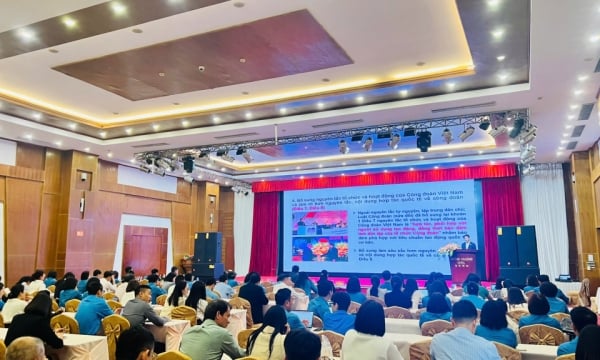(NB&CL) Theater used to have a golden age, audiences lined up to buy tickets because the stage closely followed the hot issues of life, viewers saw the stories in the plays as their own. However, now the stage lacks a diverse repertoire, theaters prefer to stage historical and folk plays, avoiding the hot issues of the times.
Inflation stage story "where is it"
At the seminar "Issues on stage scripts" recently organized by the Hanoi Theatre Association, many opinions mentioned the long-standing shortcomings in Vietnamese stage scripts, identified the causes, and found solutions to this problem.
Commenting on the current state of stage scripts, the speakers all agreed that we still lack good scripts to stage a good play. The stage is in a state of “eating on the fly”, leading to the situation of borrowing foreign scripts, or dragging old scripts to stage again. Author Giang Phong commented that modern themes on stage only account for 10%, the rest of the stage is reserved for “stories of kings, queens, and love stories from far and wide”.

The play "Tam Cam" (Author: Luu Quang Thuan; Director: People's Artist Phan Ho) by Hanoi Cheo Theater.
According to playwright Le Quy Hien, the lack of good scripts is a “very hot issue”. Occupying a lot of the stage today are old scripts with a boring motif. In anti-corruption scripts, the corrupt character is usually the director and somehow has a secretary as his mistress. War plays usually have two parts: the battlefield and the post-war part. In the battlefield part, there are cowards and brave people. In the post-war part, the brave and kind people of the past are often weak and struggling. The cowardly and opportunistic people of the past are now business directors or officials doing wrong. In the end, old comrades gather to solve the problem and resolve the conflict in the play!
“ Many scripts only show the story, not the people. The play is like telling a story through dialogue, illustrating a short story, a reportage article. It seems like the author sits on stage and asks the actors to speak for him, telling each event and explaining, but there are no characters with rich inner lives, ” said Mr. Le Quy Hien.
Determining that the script is the first step, has an important position in the play because "with flour, you can make glue", however, Mr. Le Quy Hien said that theater is a comprehensive art in which the author is only one part of the creative team. Therefore, whether the work is good or bad, the audience is interested or turns away from the work is often a shared responsibility, no one has found out the specific cause in which step. Success is due to collective effort, failure is due to the reason "with flour, you can make glue".
Referring to the role of the screenwriter, author Truong Thi Huyen said that everyone knows that a good play must certainly originate from a good script and the stage scriptwriter is extremely important. But few people know that, for a long time, the stage scriptwriter has been "forgotten".
According to Ms. Huyen, in the past, stage scriptwriters were part of the staff of a unit, but now due to financial difficulties, theaters no longer want to "support" scriptwriters. Most of the scriptwriters now work freelance, do not belong to any agency, do not have a stable income, they live entirely by "selling words". Therefore, there are very few people working as screenwriters, but if anyone still writes stage scripts, it is just a part-time job in their spare time, because of their passion.
“ In the North, there are almost no young professional stage scriptwriters. If a screenwriter could make a living from his profession, then currently in the North, there are only TV drama scriptwriters due to high demand and large broadcast volume. Stage scriptwriters, if they want to stick with their profession for a long time, need to have a stable source of income to live on. That means they have to find another stable job, then spend some free time on their passion for writing stage scripts,” Ms. Huyen said.
The female author also believes that in the field of stage scripts, there are no geniuses. Writers have to learn and know a lot. But as a freelancer, they have no qualifications to penetrate the reality of writing in agencies and units. More importantly, if you want to be properly trained, you will have to wait 5 years, even 10 years, to attend a stage scriptwriting class. " That is the average time that the Hanoi Academy of Theatre and Cinema can open a stage scriptwriting class with an intake of about 20 students. And when they graduate, there will be about half of that number, and even fewer will be able to work and make a living from the profession."

The play "Don't Fall" by Hanoi Drama Theater talks about the arduous and challenging fight against drug crimes.
The director needs to be given the “key”
According to playwright Le Quy Hien, stage scripts are not meant to be “read” but need to be staged for the audience to “watch”. However, many units currently leave it to the director to find a script or invite a director before having a script, instead of having a script and inviting a suitable director. This situation leads to the director and the author not understanding each other, and sometimes the director cannot find the “key to open the script”, and edits and cuts it “to make it better”. “As a result, the script is like an architect’s drawing to build a headquarters or hospital that has been approved, but the director is like a construction engineer who wants to make it better, but it turns into a hotel. When the play becomes a fait accompli, the artistic council that approved this play must finally approve another play,” Mr. Hien likened.
From the perspective of a stage director, director Duong Minh Giang believes that the development of a stage script depends closely on the art form and the director's intentions. However, many young playwrights have limited knowledge of history and culture. This knowledge gap causes them to distort historical figures according to their own subjective thinking and imagination. Mr. Giang believes that this is alarming, something that cultural management agencies must pay attention to and care about.
Explaining the scarcity of modern stage plays on stage, author Giang Phong said that the reason comes from "bread and butter". In the context of fierce competition with other forms of entertainment, stage units are forced to proactively build suitable repertoires to generate revenue. In addition, theater leaders are still "afraid" of touching on hot, sensitive issues, which may cause plays not to be performed. Performing historical and folk plays is still safer. Author Giang Phong warned that being away from reality and the Party's requirements for culture and arts is a deviation. If this situation continues, only the people will suffer.

The play "Miss Xuan Huong" by Hanoi Opera House.
To overcome the current situation of “bias towards past topics and avoidance of modern topics”, the speakers proposed a number of solutions such as theatre units needing to have a plan to build a repertoire to serve the public’s needs for theatre; organizing practical field trips and writing camps; building a team of new authors; organizing a theatre author club to create conditions for them to interact and exchange creativity…
According to People's Artist Nguyen Hoang Tuan, Chairman of the Hanoi Theater Association, Vietnamese theater in recent years has been backward, unable to keep up with the rapid pace of social development, and has been stuck with themes about the past, history, or everyday conflicts. Identifying the difficulties and shortcomings today is the first step to improving the situation, so that Vietnamese theater can find a path of innovation, keep up with modern life, and continue to play an important role in social life.
T.Toan
Source: https://www.congluan.vn/san-khau-chi-xao-nau-kich-ban-cu-vi-dau-nen-noi-post324235.html





![[Photo] Looking back at the impressive moments of the Vietnamese rescue team in Myanmar](https://vstatic.vietnam.vn/vietnam/resource/IMAGE/2025/4/11/5623ca902a934e19b604c718265249d0)
![[Photo] "Beauties" participate in the parade rehearsal at Bien Hoa airport](https://vstatic.vietnam.vn/vietnam/resource/IMAGE/2025/4/11/155502af3384431e918de0e2e585d13a)


























![[Photo] Summary of parade practice in preparation for the April 30th celebration](https://vstatic.vietnam.vn/vietnam/resource/IMAGE/2025/4/11/78cfee0f2cc045b387ff1a4362b5950f)





























































Comment (0)